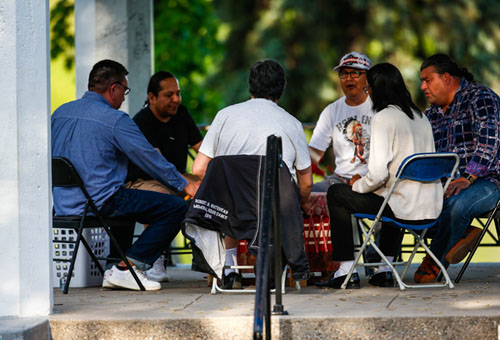


Build your own live instructor led course by combining modules (2 hours each) to produce a full day of training or spread out training sessions over several days. Completely customizable based upon your specific needs. Eleven different modules to choose from.

One way to promote a drug free community is to create more awareness of the issue within the community. Take the first step by planning a Community Drug Awareness Presentation. During this presentation, your attendees will learn about opiates and methamphetamines which have gained in popularity and negatively impacted your community. They will learn how substance misuse is affecting youth, to recognize behaviors that are associated with substance misuse, and what medical responses are necessary.

Drug endangered children are part of a very large, and growing population of children whose lives have been seriously and negatively impacted by dangerous drugs. Thousands of these children across our country go unnoticed and do not receive the necessary care and treatment to heal from these abusive environments. If ignored and left unsupported these children continue to be victims caught in a cycle of drug abuse. This Core Drug Endangered Children (DEC) Awareness training looks at overcoming the challenges in aligning the agencies and systems responsible for preventing, intervening, and treating these issues to change the trajectories of the lives of drug endangered children and break multi-generational cycles of abuse and neglect.

Examine common issues faced by law enforcement and service providers when encountering a person in crisis. Review methods to prevent or intervene in a crisis situation in which mental illness is a factor, including de-escalation and communication techniques. Identify presenting symptoms of various types of mental health disorders. Explore intervention strategies and methods for assessing the presence of suicidal intention. Discuss the lifelong impact that trauma has on individuals such as veterans, children, domestic violence survivors, and individuals impacted by historical trauma.

Join us to discuss approaches to overcoming the challenges in aligning agencies and systems responsible for preventing, intervening, and treating these issues to change the trajectories of the lives of drug endangered children. Explore best practices in breaking the multi-generational cycles of misuse and neglect. Examine steps to implement the Drug Endangered Children (DEC) Approach, a comprehensive strategy based on a common vision, collaboration that is on-going between various disciplines and agencies, and on-going changes in practice. Participate in trainer-led discussions and hands-on exercises that demonstrate how implementing collaboration enhances the likelihood of better outcomes for drug endangered children.

The opioid crisis and the flood of other drugs has reached epidemic proportion in many of our tribal communities across the nation. According to the 2018 National Survey on Drug Use and Health Tables, twice as many American Indians and Alaska Natives require treatment for addiction compared to any other racial and ethnic group. Learn to recognize the signs and symptoms of use or misuse of opiates, heroin, methamphetamines, cocaine, other stimulants, hallucinogens, marijuana, synthetic cannabinoids, alcohol and other depressants, inhalants, dissociative anesthetics, other chemicals and various drug combinations. Review updated trends on Fentanyl, Fentanyl laced pills, heroin, cocaine, methamphetamines, synthetic cannabinoids, Butane hash oil, vaping, and cannabis edibles.

The opioid crisis and the flood of other drugs has reached epidemic proportion in many of our tribal communities across the nation. Review emerging drug trends such as Fentanyl, Fentanyl laced pills, heroin, cocaine, methamphetamines, synthetic cannabinoids, and other chemicals. Discuss specific challenges associated with vaping, butane hash oil, cannabis edibles. Explore the issues these “new drug delivery systems” have caused many states and tribal communities. Consider how particular drugs are designed and why the designs of these drugs are so popular. Review the stages of use, addiction, withdrawal symptoms, and the health and life-threatening dangers posed from the use of drugs. Discuss common delivery systems and observe examples of emerging drugs in various forms. Recognize the signs and symptoms of drug usage, as well as how Naloxone/Narcan works in cases of opioid overdoses.

Examine the proven specific steps and techniques for local practitioners to establish a formal DEC alliance. Participate in instructor led discussions and activities focused on key stakeholders who should be at the table to help form a local DEC alliance, challenges of collaboration and sustaining that collaboration, and the benefits of changing practices and procedures on an on-going basis to benefit drug endangered children. Discuss and develop protocols and MOU’s to assist disciplines in institutionalizing DEC efforts and responses within each community. Explore successes and experiences of local DEC alliances in various jurisdictions across the country, including tribal communities.

Experts say the United States is in the throes of an opioid epidemic, as more than two million of Americans have become dependent on or abused prescription pain pills and street drugs. One person dies every 12 minutes from a prescription drug overdose in the United States. Join us for this vital training to learn which opiates and depressants are abused most frequently and about the dangers of new synthetics, including Fentanyl. Examine stages of use, addiction, and withdrawal symptoms, and the health and life-threatening dangers posed by the use of these drugs. A MUST-ATTEND training to help you build knowledge to address this national crisis.

Identify risks to drug endangered children and what all disciplines can look for when collecting evidence and information on drug endangered children. Review pictures and videos of real DEC scenarios to assist professionals in understanding what to look for regarding the “life of the child”. Participate in trainer led discussions and hands on exercises that demonstrate how implementing collaboration enhances the likelihood of better outcomes for drug endangered children.
